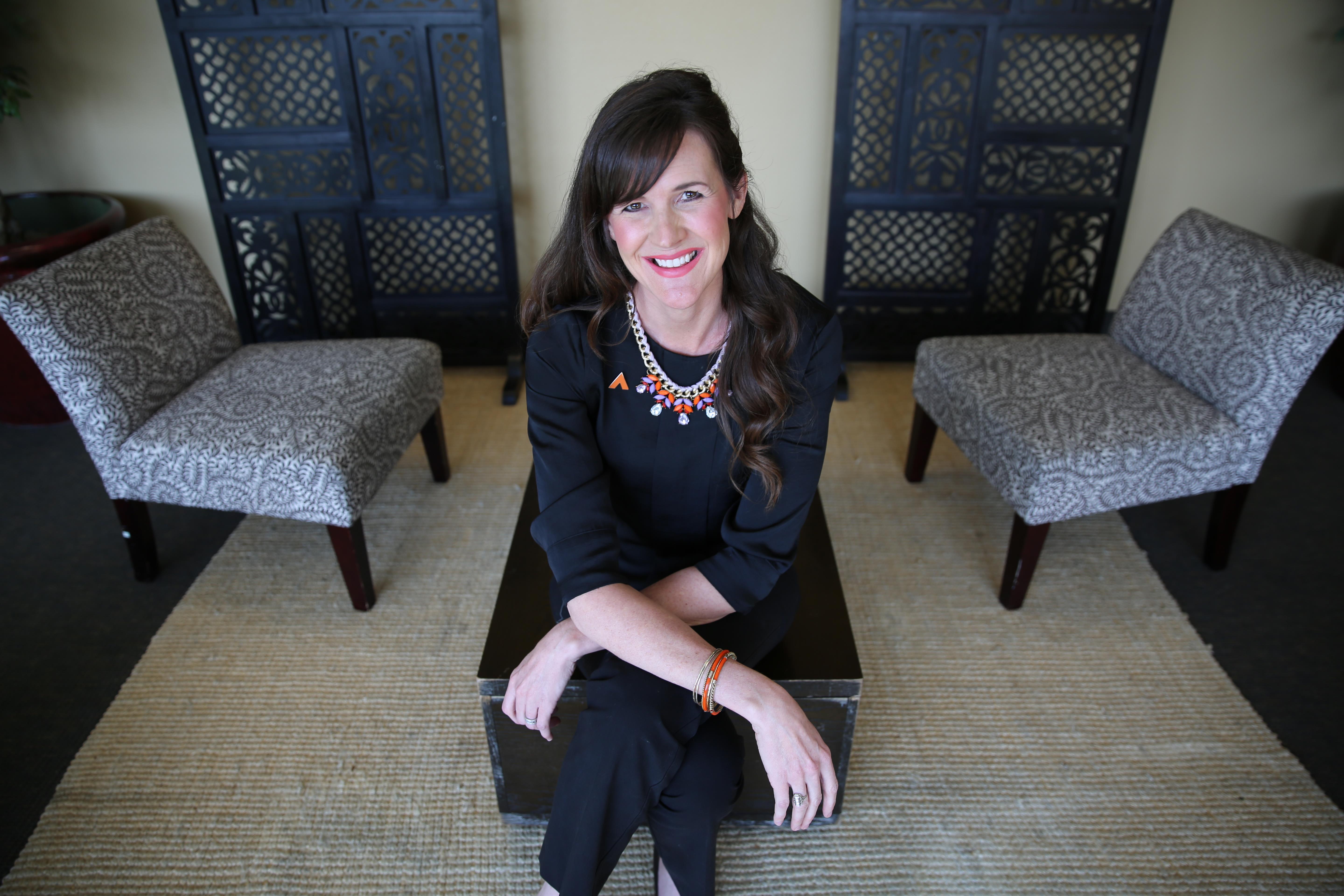Daily Business Report-Dec. 5, 2019
‘We look forward to using this funding to connect small business owners with access to resources, education and fairly priced, flexible capital,’ said Accion CEO Elizabeth Schott. (Photo courtesy of Accion)
Nonprofit lender Accion awarded
$714,000 grant from U.S. Treasury Dept.
Local nonprofit lender Accion was awarded a $714,000 grant from the U.S. Department of the Treasury’s Community Development Financial Institutions Fund (CDFI). The CDFI Fund uses federal resources to invest in local lenders to build capacity to serve low-income people and communities that lack access to affordable financial products and services.
Accion in Southern California is the only San Diego-based organization to win this award in 2019. In total, the organization has won nearly $7 million in federal funding in the nine times it has received the award since 1998.
The fund will be used for loan capital, which will be deployed in the four counties that Accion serves: Imperial, Riverside, San Bernardino, and San Diego.
“We’re honored to receive this highly selective award, which will support our work in Southern California to strengthen communities through our loan program,” said CEO Elizabeth Schott. “We look forward to using this funding to connect small business owners with access to resources, education and fairly priced, flexible capital.”
One other member of the Accion U.S. Network, the largest micro- and small business lending network in the United States, was also awarded the CDFI grant; Accion Serving the East Coast received $674,000 to support its work from Maine to Florida.
Of the 412 organizations that applied for the 2019 grant, Accion in Southern California is one of the 284 organizations that was awarded funding. The CDFI Fund awarded a total of $188.7 million to organizations in 45 states, the District of Columbia and Puerto Rico.
___________________

Tribal-state relations to be focal point at winter
meeting of Legislators from Gaming States
With Indian gaming operating in 29 states nationwide, the agreements negotiated between tribes and state governments can have lasting economic, fiscal and social impacts on the tribe, the local area, and the state.
The process of making and renegotiating these tribal-state compacts will be a focal point at the Winter Meeting of the National Council of Legislators from Gaming States (NCLGS) Jan. 10-12 at the Marriott Marquis San Diego Marina.
The Winter Meeting is open to the public. To view the agenda, register, and book rooms at the host hotel at special attendee rates, click here.
“Indian gaming is best positioned to achieve important goals for communities when legislators and tribal leaders work together in forged partnerships,” said Florida state Sen. Perry Thurston, an NCLGS officer who chairs the Committee on Indian Gaming. “That is what we learned in Florida and other states, and that is what we are striving for at NCLGS.”
Already a $34 billion industry nationwide, including more than $9 billion in California, the additions of sports betting and igaming will elevate the tribal gaming industry to new economic heights, thus placing renewed emphasis on the tribal-state compacts. The NCLGS Committee on Indian Gaming will examine the compacting process, the key elements to be debated, and what impacts can be expected among the host tribes and stakeholders. The Committee will hear from the following experts:
Speakers will include:
- Susan Jensen, executive director, California Nations Indian Gaming Association.
- Cody Martinez, chairman, Sycuan Band of the Kumeyaay Nation.
- Dr. Katherine Spilde, professor, L. Robert Payne School of Hospitality & Tourism Management, San Diego State University.
___________________
Swift Real Estate Partners acquires
Del Mar Heights office buildings
Swift Real Estate Partners, a commercial real estate investment firm in San Francisco, has acquired CPTwo — two four-story office buildings totaling 119,000 square feet in Del Mar Heights. The buildings are on High Bluff Drive.
Swift said its upcoming planned capital improvements will draw new tenants searching for experiential office space and allow CPTwo to compete with neighboring Class A assets along the best commercial corridor in Del Mar.
Work will include redesigned outdoor meeting spaces and indoor lobbies, new local coffee purveyor with food and beverage offerings and an activated fitness area with the latest wellness equipment and programming.
___________________
From ‘fake news’ to ‘guilty’
By Dan Morain | CalMatters
Moments after securing a guilty plea from Congressman Duncan Hunter, Assistant U.S. Attorney Phillip Halpern answered Hunter’s claim that he was the victim of “fake news” and a “witch hunt.”
Morgan Cook.
Cook is The San Diego Union Tribune reporter who, with her colleagues, started digging into Hunter’s use of campaign money in 2016, after the Federal Elections Commission issued a letter questioning Hunter’s use of campaign funds to purchase video games and pay for his kids’ tuition at a Christian school in El Cajon.
Halpern, outside the San Diego federal courthouse:
“The fact is that the case began when Morgan Cook published an article in the U-T. I read that article. I discussed it with [colleagues] … I went to the FBI and we said, ‘Look at this. Is there a case?’ … Nothing could have been more a-political.”
Hunter and his wife, Margaret, were indicted in 2018 on federal charges of using $250,000 in campaign funds for personal expenses.
On Tuesday, Hunter admitted to a single count of conspiracy to misuse campaign money starting in 2010 to 2016.
Hunter, a Republican and former Marine, was elected in 2009 to a North San Diego County seat held by his father. He endorsed Donald Trump’s presidential campaign early, and invoked Trump’s language to denounce his accusers.
Halpern: “No figure, regardless of what office they occupy, should be allowed in this country to cry witch-hunt or fake news and attempt to deflect their criminal wrongdoings.”
Hunter’s sentencing is set for March 17.
___________________
U.S. drone registration nears 1.5 million
According to the recent figures released by the FAA, there are nearly 1.5 million unmanned aircraft systems, or drones, registered in the United States. This number includes 416,210 that are registered for commercial purposes. The FAA has also certified 158,554 remote pilots since Part 107 of the Federal Aviation Regulations, also known as the Small UAS Rules, was established in August 2016. More information about drone registration is available on the FAA’s Drone Zone website.
___________________
DOJ releases updated policy on use
of UAS in law enforcement
The Department of Justice has released a new version of its policy on the use of unmanned aircraft systems in investigations, search and rescue operations and other authorized law enforcement activities.
The updated policy adds additional measures to ensure the security of the U.S. supply chain, address cybersecurity concerns and protect privacy and civil liberties.
The guideline also requires DOJ’s law enforcement components to evaluate acquisitions of drones for cybersecurity risks in order to deter potential threats to the department’s critical networks.
Beth Williams, assistant attorney general for the Office of Legal Policy, said the public safety organizations can use the latest version of the policy as a framework to develop their own drone programs and best practices as well as exercise responsible use of the technology.
— ExecutiveGov
___________________
Thirty Three Threads brings industry
veteran Gill Hong as new CEO

Gill Hong has been named chief executive officer of Thirty Three Threads Inc. in San Diego. She also will serve on the board of directors. Joe Patterson, company founder and prior CEO, will transition to the roles of chairman and chief operating officer.
Hong comes to Thirty Three Threads with over 25 years of experience in the activewear space, having held senior management positions with Speedo, Nike, and Oakley. Most recently, she served as executive vice president, chief merchandising officer and head of international for Lands’ End Inc.
“I’m joining Thirty Three Threads at a pivotal time. The activewear industry continues to accelerate globally, and combined with the high growth of boutique studio fitness, Thirty Three Threads is well positioned to see tremendous growth in the coming years,” said Hong. “Thirty Three Threads has a unique product offering among its three brands and substantial distribution throughout the world. The ability to continue to build on the authentic, premium positioning the company has established in the fitness sector is very exciting.”
The company’s brands are Tavi Noir, ToeSox and Base 33.
___________________
Biocom appoints Karmin Noar as
executive director of Biocom Institute

Karmin Noar has been appointed executive director for Biocom Institute, the nonprofit that supports the life science industry. In this role, she will oversee strategies, programs and staff and drive initiatives focused on STEM education and workforce development.
The appointment was announced by Biocom, the association representing the California life science industry.
Noar has more than a decade of volunteer and work experience in the nonprofit sector, working on issues from public health and education to youth and workforce development. Prior to joining Biocom Institute, she served as director of programs at the San Diego Workforce Partnership (SDWP). During her time at SDWP, Noar increased funding from approximately $250,000 to over $3 million resulting in workforce development programs that received local and national recognition and over 10,000 youth and adults placed in jobs and internships.
She holds two bachelor’s degrees in political science and ethnic studies from the University of California, San Diego and a master’s degree in education from Pepperdine University’s Graduate School of Education & Psychology.
___________________
University of San Diego MBA ranks
among the Top 10 Green MBAs in Nation
The University of San Diego School of Business ranks No. 10 Best Green MBA in the U.S. and No. 2 in California, according to the Princeton Review’s latest MBA rankings.
This recognition is based on a survey of 20,700 MBA students who assessed how well their school prepares them in environmental/sustainability and social responsibility issues for a career in the green job market.
The USD MBA program also requires 15 hours of community service where students help a local nonprofit solve a business issue and the program also offers a concentration on Corporate Social Responsibility and Sustainable Enterprise.
The USD School of Business MBA also was included in the Princeton Review’s list of best business schools for an on-campus MBA program. Business schools were selected based on a combination of institutional and survey data, including career outcomes, admissions selectivity and academic rigor.
___________________
REPLENISHMENT

__________________
Commentary
Another showdown over crime looms
A referendum seeking to overturn California’s landmark ban on cash bail in criminal cases will once again test voters’ sentiments about the treatment of accused lawbreakers
By Dan Walters | CalMatters

No California ballot would be complete without at least one measure about crime and punishment and 2020 will be no exception.
A referendum seeking to overturn California’s landmark ban on cash bail in criminal cases will once again test voters’ sentiments about the treatment of accused lawbreakers.
During previous decades, particularly in the 1980s and 1990s, voters endorsed a tough, lock-‘em-up attitude, culminating in passage of the state’s famous — or infamous — three-strikes-and-you’re-out lawaimed at repeat offenders.
At some point — roughly a decade ago — voter attitudes about crime softened and criminal justice reform advocates began winning in the political arena.
When Jerry Brown returned to the governorship in 2011, he strived to undo some of the punishment laws he had signed three decades earlier by reducing penalties for crimes deemed to be nonviolent, diverting more offenders into probation rather than putting them behind bars and making it easier for felons to win parole.
Law enforcement officials objected, saying that fewer offenders behind bars would imperil the public, but in 2014, Brown won passage of a key ballot measure, Proposition 47, encompassing his reforms.
As his second governorship was ending last year, Brown also championed and signed legislation, Senate Bill 10, to eliminate cash bail — a long-sought goal of civil rights and criminal justice advocacy groups.
They argued that the bail system discriminates against the poor who are unable to either post bail themselves or afford the fees of private bail bond agents.
Under the legislation, those accused of minor, non-violent offenses would almost automatically be freed while awaiting trial and other defendants would be evaluated for their flight risk with judges having the final word on who would remain locked up.
SB 10 would, in effect, erase an entire industry, California’s 3,000-plus bail bond agencies, and, not surprisingly, they decided to fight back. Very quickly, a bail industry coalition raised money to qualify a referendum for the 2020 ballot to overturn the new law, whose implementation is now suspended until the voters have spoken.
Bail agents are clearly poised to spend millions of dollars to preserve their livelihoods and now the Service Employees International Union (SEIU) is committing itself to finance a pro-SB 10 campaign.
The SEIU has couched its support for SB 10 in terms of civil rights and protecting poor people from a rapacious industry. However, it also has a financial interest in the outcome because ending cash bail would mean adding thousands of new unionized workers to county probation departments for evaluating defendants.
So the stage is set for another political showdown on crime, with the particularly tricky procedure of a referendum. The question on the ballot will be whether voters want to keep SB 10 in force, so the bail agent coalition will be seeking a “no” vote while SEIU and other supporters will want voters to say “yes.”
Initially, it’s difficult to say which side has a better chance of prevailing. A statewide poll conducted by UC Berkeley’s Institute of Governmental Studies in September found that 39 percent of voters are inclined to vote “yes” to support the new law, while 32 percent are opposed and 29 percent are undecided.
There’s a partisan division, with Democrats in support and Republicans opposed, so that should give SB 10 supporters an edge. But voters now on the fence will have the final word and that’s where both sides will concentrate what is likely to be their emotion-laden appeals.
CalMatters is a public interest journalism venture committed to explaining how California’s state Capitol works and why it matters. For more stories by Dan Walters, go to calmatters.org/commentary.



